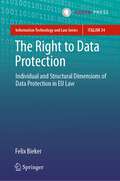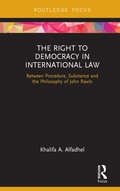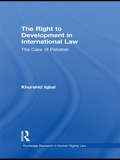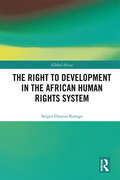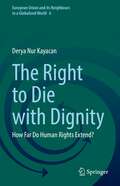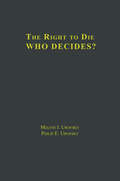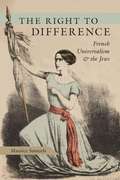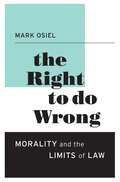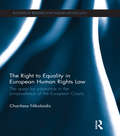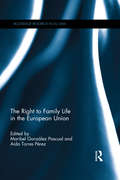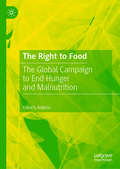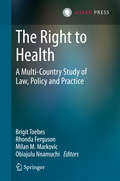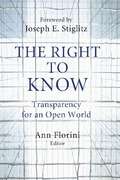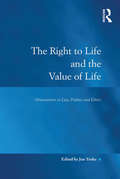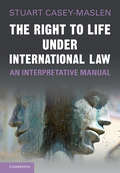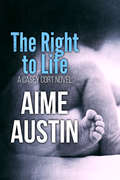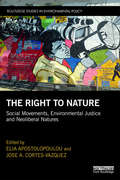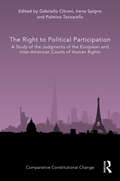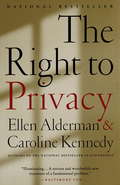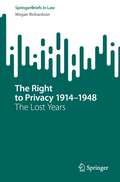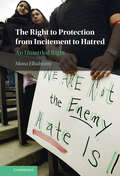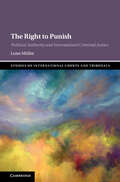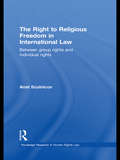- Table View
- List View
The Right to Data Protection: Individual and Structural Dimensions of Data Protection in EU Law (Information Technology and Law Series #34)
by Felix BiekerThis book advances an approach that combines the individual and the structural, systemic dimensions of data protection. It considers the right to data protection under the EU Charter and its relationship to the secondary legislation. Furthermore, the case law of the Court of Justice of the EU as well as current academic conceptualizations are analysed. The author finds that current approaches invariably link data protection to privacy and often fail to address the structural implications of data processing. He therefore suggests a dualistic approach to data protection: in its individual dimension, data protection aims to protect natural persons and their rights, while the structural dimension protects the democratic society as a whole from the adverse effects of data processing. Using this approach, the full potential of an independent right to data protection can be realized. Researchers, practitioners and students will find this a valuable resource on the rationales, scope and application of data protection. Felix Bieker is Legal Researcher at the Office of the Data Protection Commissioner of Schleswig-Holstein (Unabhängiges Landeszentrum für Datenschutz) in Kiel, Germany.
The Right to Democracy in International Law: Between Procedure, Substance and the Philosophy of John Rawls (Routledge Research in International Law)
by Khalifa A AlfadhelThis book explores the right to democracy in international law and contemporary democratic theory, asking whether international law encompasses a substantive or procedural understanding of the notion. The book considers whether there can be considered to be a basis for the right to democracy in international customary law through identification of the relevant State practice and opinio juris, as well as through an evaluation of the Universal Declaration of Human Rights and whether the relevant provisions might be interpreted as forming customary law. The book then goes on to explore the relevant provisions in international treaties including the International Covenant on Civil and Political Rights before looking at the role of regional organizations and human rights regimes including the European Court of Human Rights and the Arab human rights regime. Khalifa A. Alfadhel draws on the work of John Rawls in order to put forward a theoretical basis for the right to democracy.
The Right to Development in International Law: The Case of Pakistan (Routledge Research in Human Rights Law #Vol. 3)
by Khurshid IqbalThe Right to Development in International Law rigorously explores the right to development (RTD) from the perspectives of international law as well as the constitutionally guaranteed fundamental rights and the Islamic concept of social justice in Pakistan. The volume draws on a wide range of relevant sources to analyse the legal status of international cooperation in contemporary international law, before exploring the domestic application of the right to development looking at the example of Pakistan, a country that is undergoing radical transformation in terms of its internal governance structures and the challenges it faces for enforcing the rule of law. Of particular importance is the examination of the RTD and Shari‘ah law in Pakistan which adds a new perspective to the RTD debate and enriches the discussion about human rights and Shari‘ah across the world. Through focusing on Pakistan the book links international perspectives and the international human rights framework with the domestic constitutional apparatus for enforcing the RTD within that jurisdiction. In doing so, Khurshid Iqbal argues that the RTD may be promoted through existing constitutional mechanisms if fundamental rights are widely interpreted by the superior courts, effectively implemented by the lower courts and if Shari‘ah law is progressively interpreted in public interest. Iqbal’s work will appeal to researchers, professionals and students in the fields of law, human rights, development, international law, South Asian Studies, Islamic law and international development studies.
The Right to Development in the African Human Rights System (Global Africa)
by Serges Djoyou KamgaThe right to development (RTD) seeks to address global inequities hidden in world politics and global institutions through the game of influences played by powerful actors. The negative impacts of the Atlantic slave trade, colonialism, and the subjugation of Africa through globalisation and its institutions are key factors that have caused Africa and African people claiming their RTD. This book examines how the African continent protects the right to development, examining the nature of the RTD and controversies surrounding it and how it is implemented. The book then goes onto explore the RTD at the regional level including through the jurisprudence of the African Commission and the African Court on Human Rights, at the sub-regional level including in sub-regional courts and tribunals, at the national levels through case studies and through the African Union governance institutions. Through this examination, the author unveils what are the prospects and challenges to the realisation of the RTD in Africa.
The Right to Die with Dignity: How Far Do Human Rights Extend? (European Union and its Neighbours in a Globalized World #6)
by Derya Nur Kayacan“Can I choose to die?” As the number of requests for euthanasia and physician-assisted suicide continues to rise, human rights law faces a new conflict: the right to die vs. the right to life… The right to die or, in other words, ‘the right to choose the time and manner of one’s own death’ is a question of personal autonomy and its limits. This book provides a comprehensive understanding of the right to die and sheds light on its possible future under the European Convention on Human Rights. After setting a clear framework by defining the key terminology, the book takes a two-part approach to achieving its aim. The first part focuses on the right to die in practice by examining selected jurisdictions. Switzerland, which is famous for its assisted suicide organizations, and the Netherlands, which was the first country to legalize euthanasia, are examined in detail. Belgium, Germany, the United Kingdom, and -as an exception to the Convention perspective - Canada are also included. While this examination offers a better understanding of what the right to die looks like in practice, it also provides insights on the slippery slope argument, which serves as a counterweight to personal autonomy, without making a definitive statement on its validity. This part also illustrates the different paths that led or did not lead to the right to die in practice. The second part is an analysis of the European Court of Human Rights case law on the right to die. The Court has made important statements in only very cases, while its caution when approaching such a delicate and controversial topic among its 47 members is understandably emphasized. This analysis of the Court’s approach to the balancing of personal autonomy against other interests allows us to take a look back at the practice in more permissive jurisdictions through the lens of the Convention. Taken together, the book’s two parts provide valuable lessons for countries that decide to practice assisted dying, which are outlined in the conclusion. In addition, given that a purely legal approach can only offer a partial picture, the book argues that an interdisciplinary approach would be much more favorable in terms of providing the necessary basis for the right to die debate.
The Right to Die: V1 Definitions and Moral Perspectives: Death, Euthanasia, Suicide, and Living Wills, V2 Who Decides? Issues and Case Studies
by Melvin I. UrofskyFirst Published in 1996. The key issue in all right-to-die matters is “who decides?” Who will decide whether life support should be terminated? Who will decide if a person is competent to make life and death decisions? The law is quite clear that, in cases of conscious, competent adults, the individual is free to make all decisions relating to his or her care and future. This volume is a collection of writings and case studies around the topics of personal choice, AIDS and informed consent, due process and the right to die.
The Right to Difference: French Universalism and the Jews
by Maurice SamuelsUniversal equality is a treasured political concept in France, but recent anxiety over the country's Muslim minority has led to an emphasis on a new form of universalism, one promoting loyalty to the nation at the expense of all ethnic and religious affiliations. This timely book offers a fresh perspective on the debate by showing that French equality has not always demanded an erasure of differences. Through close and contextualized readings of the way that major novelists, philosophers, filmmakers, and political figures have struggled with the question of integrating Jews into French society, Maurice Samuels draws lessons about how the French have often understood the universal in relation to the particular. Samuels demonstrates that Jewish difference has always been essential to the elaboration of French universalism, whether as its foil or as proof of its reach. He traces the development of this discourse through key moments in French history, from debates over granting Jews civil rights during the Revolution, through the Dreyfus Affair and Vichy, and up to the rise of a "new antisemitism" in recent years. By recovering the forgotten history of a more open, pluralistic form of French universalism, Samuels points toward new ways of moving beyond current ethnic and religious dilemmas and argues for a more inclusive view of what constitutes political discourse in France.
The Right to Do Wrong: Morality and the Limits of Law
by Mark OsielMuch of what we could do, we shouldn’t—and we don’t. Mark Osiel shows that common morality—expressed as shame, outrage, and stigma—is society’s first line of defense against transgressions. Social norms can be indefensible, but when they complement the law, they can save us from an alternative that is far worse: a repressive legal regime.
The Right to Equality in European Human Rights Law: The Quest for Substance in the Jurisprudence of the European Courts (Routledge Research in Human Rights Law)
by Charilaos NikolaidisA right to equality and non-discrimination is widely seen as fundamental in democratic legal systems. But failure to identify the human interest that equality aims to uphold reinforces the argument of those who attack it as morally empty or unsubstantiated and weakens its status as a fundamental human right. This book argues that an understanding of the human interest which equality aims to uphold is feasible within the jurisprudence of the European Court of Human Rights (ECtHR) and the European Court of Justice (ECJ). In comparing the evolution of the prohibition of discrimination in the case-law of both Courts, Charilaos Nikolaidis demonstrates that conceptual convergence within the European Convention on Human Rights (ECHR) and the EU on the issue of equality is not as far as it might appear initially. While the two bodies of equality law are extremely divergent as to the requirements they impose, their interpretation by the international judiciary might be properly analysed under a common light to emphasise the substantive dimension of equality in European Human Rights law. The book will be of great use and interest to scholars and students of human rights, discrimination law, and European politics.
The Right to Family Life in the European Union (Routledge Research in EU Law)
by Maribel González Pascual Aida Torres PérezExploring the main developments and challenges for the right to family life in the context of European integration, this book examines the right to family life in the EU Charter of Fundamental Rights and the interplay between family life, citizenship, and free movement; it analyzes the combined impact of the EU and the European Convention on Human Rights on the concept of the family protected by the law in light of recent case law. Considering the broadening understanding of what constitutes family, the challenges for the right to family life in the context of immigration, and the protection of families and social rights it provides a comprehensive overview of the current state of family life in the European Union.
The Right to Food: The Global Campaign to End Hunger and Malnutrition
by Francis AdamsThis book examines the global campaign to end hunger and malnutrition. Focus is placed on the work of the United Nations which has led international efforts to improve food security in the world’s poorest countries. The book first reviews the long-term project to establish access to safe, sufficient, and nutritious food as a universally recognized human right. This is followed by separate chapters that examine the nature and central causes of food insecurity in Latin America, Africa, the Middle East, and Asia. These chapters also review the contemporary work of three United Nations agencies – the World Food Programme, Food and Agriculture Organization, and International Fund for Agricultural Development – in providing both food aid and food assistance to each region of the developing world. This includes the provision of emergency food aid in response to natural disaster and civil conflict, as well as longer-term food assistance to promote agricultural productivity, advance rural development, and preserve natural environments. The concluding chapter considers ways to strengthen food aid and assistance in the years to come, with many of the recommendations advanced reflecting lessons learned from the actual experience of food aid and assistance described in this book.
The Right to Health
by Brigit Toebes Rhonda Ferguson Milan M. Markovic Obiajulu NnamuchiThis interdisciplinary study engages with the fields of human rights law, health law, and public health. It analyses how the internationally guaranteed human 'right to health' is realized by States at a national level. It brings together scholars from more than ten different countries, with each of them analyzing the right to health in their country or region. They all focus on a particular theme that is important in their country, such as health inequalities, the Millennium Development Goals, or the privatization of healthcare. This book is relevant for scholars, practitioners and policy makers in the field of human rights law, health law, public health and the intersection between these three fields.
The Right to Health Care: Ethical Considerations (The International Library of Bioethics #92)
by Eike-Henner W. KlugeThis book provides an in-depth ethical analysis of the right to health care by contrasting privatized with socialized approaches. It pays special attention to how a socialized approach can be implemented in the context of limited resources and offers a way of integrating allocation decisions at the policy level with institutional and hands-on decision-making. It also discusses how the right to health care translates into duties on part of the members of society. In an Appendix, it suggests how, in time of need, the TRIPS Agreement allows countries to side-step patent regulations that would otherwise raise the cost of patented healthcare products beyond what a particular society is able to afford. The book is of interest not only to scholars but also to healthcare policy makers, administrators and healthcare professionals, as well as to patients themselves.
The Right to Health at the Public/Private Divide
by Colleen M. Flood Aeyal GrossThrough a comparative global study of countries from all continents representing a diversity of health, legal, political, and economic systems, this book explores the role of health rights to advance greater equality through access to health care. Does health care promote equality, or does it in fact advance the opposite result? Does inserting the idea of "the right to health" into health systems allow the reinsertion of public values into systems that are undergoing privatization? Or does it allow for private claims to be rearticulated as "rights," in a way that actually reinforces inequality? This volume includes studies from countries such as the United States, the United Kingdom, Brazil, Canada, The Netherlands, China, and Nigeria, among many others, as well as authors with expertise regarding both the legal and health systems of their countries, making this a seminal study that allows readers to see the differing role of rights in various health systems.
The Right to Know: Transparency for an Open World (Initiative for Policy Dialogue at Columbia: Challenges in Development and Globalization)
by Ann FloriniThe Right to Know is a timely and compelling consideration of a vital question: What information should governments and other powerful organizations disclose? Excessive secrecy corrodes democracy, facilitates corruption, and undermines good public policymaking, but keeping a lid on military strategies, personal data, and trade secrets is crucial to the protection of the public interest. Over the past several years, transparency has swept the world. India and South Africa have adopted groundbreaking national freedom of information laws. China is on the verge of promulgating new openness regulations that build on the successful experiments of such major municipalities as Shanghai. From Asia to Africa to Europe to Latin America, countries are struggling to overcome entrenched secrecy and establish effective disclosure policies. More than seventy now have or are developing major disclosure policies or laws. But most of the world's nearly 200 nations do not have coherent disclosure laws; implementation of existing rules often proves difficult; and there is no consensus about what disclosure standards should apply to the increasingly powerful private sector. As governments and corporations battle with citizens and one another over the growing demand to submit their secrets to public scrutiny, they need new insights into whether, how, and when greater openness can serve the public interest, and how to bring about beneficial forms of greater disclosure. The Right to Know distills the lessons of many nations' often bitter experience and provides careful analysis of transparency's impact on governance, business regulation, environmental protection, and national security. Its powerful lessons make it a critical companion for policymakers, executives, and activists, as well as students and scholars seeking a better understanding of how to make information policy serve the public interest.
The Right to Life and the Value of Life: Orientations in Law, Politics and Ethics (Law, Justice And Power Ser.)
by Jon YorkeThis groundbreaking book is the first collection to investigate the law, political science and ethical perspectives collectively in relation to the right and value of life. Its contributions from international roster of scholars are organized around five themes: a theoretical positioning of life and death; War, armed conflict and detention; Death as punishment; Medical parameters for ending life; and medical policies for the preservation of life. In studying this issue in its contemporary contexts of "right" and "value," the volume fills the current scholarly lacuna in the general subject of the orientations of life. It presents a much-needed examination of key issues in a broad practical and theoretical context, and holds broad appeal for scholars, researchers, and students occupied with issues of war, armed conflict, the death penalty, and various contemporary medico-legal scenarios.
The Right to Life under International Law: An Interpretative Manual
by Stuart Casey-MaslenThe Right to Life under International Law offers the first-ever comprehensive treatment under international law of the foundational human right to life. It describes the history, content, and status of the right, considers jurisdictional issues, and discusses the application of the right to a wide range of groups, such as women, children, persons with disabilities, members of minorities, LGBTI persons, refugees, and journalists. It defines the responsibility of not only governments but also the private sector, armed groups, and non-governmental organisations to respect the prohibition on arbitrary deprivation of life. It also explains the nature and substance of the duty to investigate potentially unlawful death as well as the mechanisms at global and regional level to promote respect for the right to life.
The Right to Life: A Casey Cort Novel (Casey Cort Novel #6)
by Aime AustinWhat wouldn’t a woman do for her child? Ready to start a new practice free from the stress and moral ambiguity of criminal law, Casey Cort accepts lucrative referrals from the Hudson Adoption Agency. But when she’s ready to finalize a client’s first adoption, she learns the child’s origins aren’t all they seem. After escaping a brutal home life, Alile Rubidari is denied asylum in Britain. To avoid being deported to Africa, she ventures into the shady world of illegal au pairs… And discovers that her new young charge may be the child stolen from her. Without family, money, or legal status, Alile has no means to fight for her daughter. And the ambitious surgeon who claims to be the little girl’s adoptive mother is fighting to keep her at all costs. Caught in a battle of Biblical proportions, Casey prays for the wisdom of Solomon because both women will do anything for their daughter, but a judge can only choose one mother. In this continuation of the Casey Cort series, Aime Austin—a former trial lawyer in Cleveland—weaves a tale that blends the best of today’s top legal thrillers with the heart and soul of women’s fiction, in a story ripped from real-world headlines.
The Right to Nature: Social Movements, Environmental Justice and Neoliberal Natures (Routledge Studies in Environmental Policy)
by Elia Apostolopoulou Jose A. Cortes-VazquezSince the 2008 financial crash the expansion of neoliberalism has had an enormous impact on nature-society relations around the world. In response, various environmental movements have emerged opposing the neoliberal restructuring of environmental policies using arguments that often bridge traditional divisions between the environmental and labour agendas. The Right to Nature explores the differing experiences of a number of environmental-social movements and struggles from the point of view of both activists and academics. This collection attempts to both document the social-ecological impacts of neoliberal attempts to exploit non-human nature in the post-crisis context and to analyse the opposition of emerging environmental movements and their demands for a radically different production of nature based on social needs and environmental justice. It also provides a necessary space for the exchange of ideas and experiences between academics and activists and aims to motivate further academic-activist collaborations around alternative and counter-hegemonic re-thinking of environmental politics. This book will be of great interest to students, scholars and activists interested in environmental policy, environmental justice, social and environmental movements.
The Right to Political Participation: A Study of the Judgments of the European and Inter-American Courts of Human Rights (Comparative Constitutional Change)
by Gabriella Citroni, Irene Spigno, and Palmina TanzarellaThis book provides a comparative analysis of how judgments from the European Court of Human Rights (ECtHR) and the Inter-American Court of Human Rights (IACtHR) affect political participation and electoral justice at the national level. Looking at specific countries, the work analyses the legal impact the implementation of the ECtHR and the IACtHR judgments has, with a specific focus on cases in which the regional court concerned uses the “democratic argument,” that is, an argument related to democracy and political rights. The reasoning is that, although democracy is a much wider concept, judgments concerning violations of political rights and electoral justice provide reliable indicators to assess the status and sustainability of democracy in a State. Moreover, the analysis of the violations of political rights and electoral justice allows an in-depth comparison between the two regional human rights systems. Mindful of the broader scope of the fall-out generated by the non-implementation of judgments, including in socio-economic terms, the book includes a section exploring how judgments issued by the ECtHR and the IACtHR affect voters’ participation in the countries under their jurisdiction. To this end, an original dataset including the 47 Member States of the Council of Europe and the 20 countries which recognised the adjudicatory jurisdiction of the IACtHR is built. Multidisciplinary in aim and scope of analysis, the book will be an invaluable resource for researchers, academics, and policy-makers working in the areas of constitutional law, international human rights law, and political economy.
The Right to Privacy
by Caroline Kennedy Ellen AldermanCan the police strip-search a woman who has been arrested for a minor traffic violation? Can a magazine publish an embarrassing photo of you without your permission? Does your boss have the right to read your email? Can a company monitor its employees' off-the-job lifestyles--and fire those who drink, smoke, or live with a partner of the same sex? Although the word privacy does not appear in the Constitution, most of us believe that we have an inalienable right to be left alone. Yet in arenas that range from the battlefield of abortion to the information highway, privacy is under siege. In this eye-opening and sometimes hair-raising book, Alderman and Kennedy survey hundreds of recent cases in which ordinary citizens have come up against the intrusions of government, businesses, the news media, and their own neighbors. At once shocking and instructive, up-to-date and rich in historical perspective, The Right to Private is an invaluable guide to one of the most charged issues of our time."Anyone hoping to understand the sometimes precarious state of privacy in modern America should start by reading this book."--Washington Post Book World"Skillfully weaves together unfamiliar, dramatic case histories...a book with impressive breadth."--TimeFrom the Trade Paperback edition.
The Right to Privacy 1914–1948: The Lost Years (SpringerBriefs in Law)
by Megan RichardsonThe book offers a provocative review of thinking about privacy and identity in the years encompassing and disrupted by the two world wars of the first half of the twentieth century – focusing (in particular) on the socio-technological transformations associated with modernism. It argues that, with many of the most interesting modern thinkers of the period dead or marginalised (or both) by 1948, their ideas about how rights such as privacy should develop to accommodate the exigencies of modern life failed to find much of a voice in the drafting of the Universal Declaration of Human Rights. Yet they anticipated in surprising ways some of our ‘new’ ways of thinking in more recent times. After a brief introduction, the chapters are framed in terms of case studies on the right to privacy, the right to data protection and the right to be forgotten, each finishing with a consideration of how these rights require further rethinking in the digital century.
The Right to Protection from Incitement to Hatred: An Unsettled Right
by Mona ElbahtimyAgainst the backdrop of the new globalized hate speech dynamics, the nature and scope of States' obligations pursuant to international human rights law on prohibiting incitement to hatred have taken on increased importance and have become a controversial issue within multilateral human rights diplomacy. Key questions being posed in the on-going debates over how best to respond to the new wave of hatred include whether the international legal norm against incitement to hatred, as it currently stands, is suitable to address the contemporary challenges of this phenomenon. Alternatively, does it need to be developed further? This book traces the journey of this norm in three analytical domains; its emergence, relevant supranational jurisprudence, and the recent standard-setting attempts within the UN. The book argues that five internal features of the norm had a strong influence on its difficult path within international human rights law.
The Right to Punish: Political Authority and International Criminal Justice (Studies on International Courts and Tribunals)
by Luise MüllerWhat gives international courts the authority to punish individuals for international crimes? Through the lens of political philosophy, Luise Müller provides an original perspective on the justification of the authority of international criminal courts and tribunals. She argues that institutions of international criminal justice are permitted to pierce the sovereignty of states in order to punish high-profile politicians for genocide, crimes against humanity, war crimes, and other mass human rights violations. Their right to punish is justified by virtue of their function to deter mass violations of fundamental human rights. However, to legitimately exercise that right, international criminal justice institutions must fulfil two conditions: first, they must conduct criminal trials with the highest level of fairness; second, they must treat those who are subject to their authority as equals. This last condition can be satisfied by international criminal justice institutions by including procedures of democratic decision-making and democratic accountability.
The Right to Religious Freedom in International Law: Between Group Rights and Individual Rights (Routledge Research In Human Rights Law Ser. #2)
by Anat ScolnicovThis book analyses the right to religious freedom in international law, drawing on an array of national and international cases. Taking a rigorous approach to the right to religious freedom, Anat Scolnicov argues that the interpretation and application of religious freedom must be understood as a conflict between individual and group claims of rights, and that although some states, based on their respective histories, religions, and cultures, protect the group over the individual, only an individualistic approach of international law is a coherent way of protecting religious freedom. Analysing legal structures in a variety of both Western and Non-Western jurisdictions, the book sets out a topography of different constitutional structures of religions within states and evaluates their compliance with international human rights law. The book also considers the position of women's religious freedom vis-à-vis community claims of religious freedom, of children’s right to religious freedom and of the rights of dissenters within religious groups.
